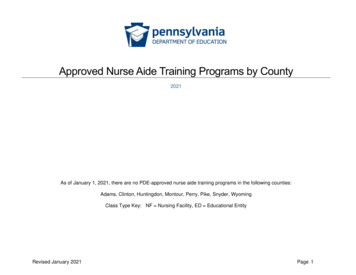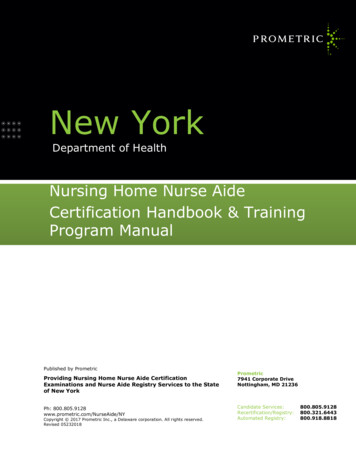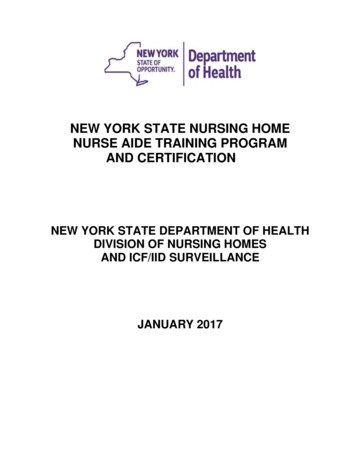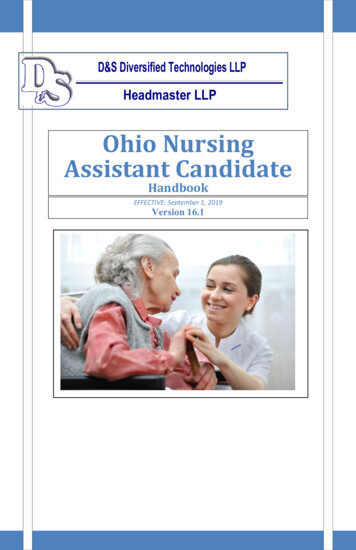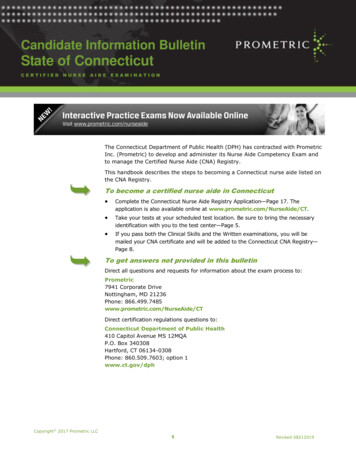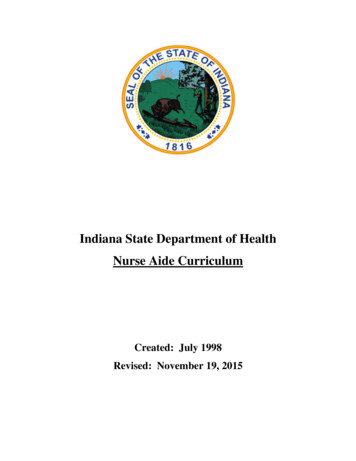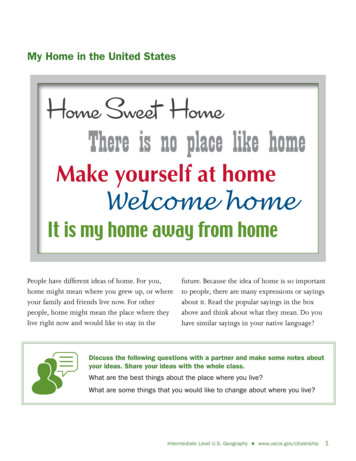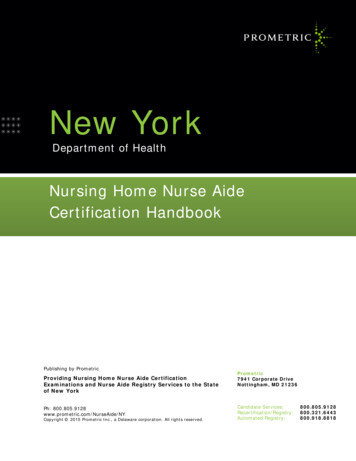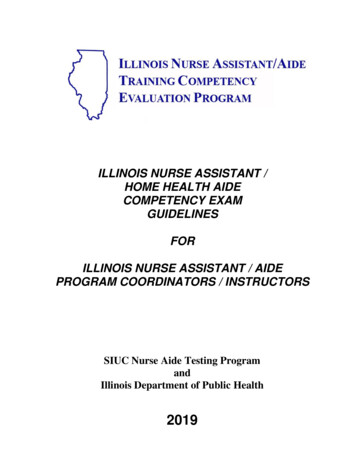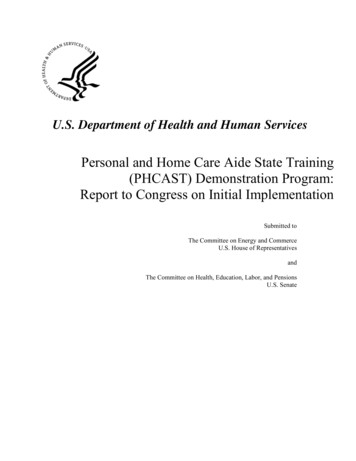
Transcription
U.S. Department of Health and Human ServicesPersonal and Home Care Aide State Training(PHCAST) Demonstration Program:Report to Congress on Initial ImplementationSubmitted toThe Committee on Energy and CommerceU.S. House of RepresentativesandThe Committee on Health, Education, Labor, and PensionsU.S. Senate
ContentsExecutive Summary . 3I. Introduction to PHCAST Program . 5PHCAST Program . 5II. PHCAST State Grantee Profiles . 8PHCAST Grantee Program Partners. 11Target Participant Pools for PHCAST Programs. 12III. States’ Program Designs, Development, and Implementation . 16Competency-Based Curricula and Training Programs . 16PHCAST Training Delivery . 29State Certification Process Measuring Core Competencies. 34Continuing Education of Long-Term Workers . 35IV. Grantee Evaluation Plans for PHCAST Programs . 38V. PHCAST Program Summary for Year One . 43Grantee Progress toward Program Benchmarks . 43Challenges Encountered in Program Implementation . 46Best Practices/Opportunities . 47VI. Planned Actions for the Remaining Grant Years . 49Summary . 49Appendix A . 51Appendix B . 60Appendix C . 97Appendix D . 992
Executive SummarySection 5507(a) of P.L. 111-148, the Patient Protection and Affordable Care Act (AffordableCare Act) requires a report to be submitted to the United States Congress on the initialimplementation of activities conducted under the demonstration of the Personal and Home CareAide State Training (PHCAST) Program. Authorized under Section 5507(a) of the AffordableCare Act, the PHCAST Program addresses a health workforce need for the training of competentdirect care workers capable of handling the needs of an aging population. PHCAST supports sixstate demonstration programs in the development, implementation and evaluation ofcompetency-based curricula and certification programs to train qualified personal and home careaides.The Affordable Care Act appropriated 5 million dollars annually for fiscal years (FY) 2010 –2012 to fund the six demonstration grants and the required evaluation. Funding included grantawards and contracts as well as costs associated with grant reviews, grant processing, andfollow-up performance reviews. Grants were awarded in FY 2010 for a 3-year project period.Annual grant amounts are approximately the same for all three years. Grantees have beenawarded the first two years of funding. Funding for the third and final year is expected to beawarded by September 30, 2012. Grant awards are as follows:GranteeFY orthCarolina 749,960 748,054 747,632 738,993 650,061 578,745Total 3yearaward 2,242,738 2,244,596 2,247,354 2,233,504 2,030,537 2,022,504Participating states are required by statute to develop written materials and protocols for thedelivery of core training competencies. The core competencies identified in Section 5507(a)include the following areas:1. The role of the personal or home care aide (including differences between a personal orhome care aide employed by an agency and a personal or home care aide employeddirectly by the health care consumer or an independent provider),2. Consumer rights, ethics, and confidentiality (including the role of proxy decision-makersin the case where a health care consumer has impaired decision-making capacity),3. Communication, cultural and linguistic competence and sensitivity, problem solving,behavior management, and relationship skills,4. Personal care skills,3
5. Health care support,6. Nutritional support,7. Infection control,8. Safety and emergency training,9. Training specific to an individual consumer‘s needs (including older individuals, youngerindividuals with disabilities, individuals with developmental disabilities, individuals withdementia, and individuals with mental and behavioral health needs), and10. Self-CareIn addition to utilizing the core competencies in the development of Personal and Home CareAide (PHCA) curricula, states are required to develop a certification test for PHCAs who havecompleted such training competencies.These grantees bring a wide range of expertise in personal and home care service deliveryexperience to this effort. Through these funding efforts, best practices and key opportunities arehighlighted.A variety of sources were used to develop this report, including information about granteeprograms gathered by reviewing program documentation and through discussions with granteesin group training, technical assistance calls and individual calls, as well as group discussions andindividual consultations held during an all-grantee meeting.This report fulfills a legislative mandate and provides an overview of the six state grantees, theirtraining programs, and their target trainee participant pools. Key elements of the granteeprograms, including their design processes, core curricula and competencies, programimplementation, certification processes, continuing education, and evaluation plans are coveredin this report. The final section discusses the grantees’ progress toward program benchmarksand the challenges that have been encountered by grantees in implementing their programs.Early best practices, implementation challenges, and initial evaluation activities are alsoreviewed, along with key recommendations for the remaining grant years. Grantees’ programdetails are included in Appendix A, including summaries of grantee programs, availablecurricula and supporting materials, and common performance measures.4
I. Introduction to PHCAST ProgramToday’s growing population of elderly Americans, along with the number of individuals livingwith disabilities or other chronic conditions, is outpacing the number of workers with theknowledge and skills to effectively care for them. Direct care workers now provide an estimated70 to 80 percent of the hands-on assistance to individuals with long-term and personal assistanceneeds. These individuals are increasingly being moved out of hospitals and skilled nursingfacilities in order to be treated in their own homes or resident-based care homes. Personal andHome Care Aides (PHCA) are included in the direct care workforce and are projected by theBureau of Labor Statistics to be the fourth fastest growing direct care occupation from 2008 to2018. This represents an expected increase of 46 percent in the demand for these types ofpositions. However, there are currently few uniform training standards for direct care workers atthe state level and there are no nationally recognized certifications. 1Personal and Home Care Aide State Training (PHCAST) ProgramThe Personal and Home Care Aide State Training (PHCAST) Program was authorized underSection 5507(a) of P.L. 111-148, the Patient Protection and Affordable Care Act (AffordableCare Act). This program supports state demonstration programs in the development,implementation and evaluation of competency-based curricula and certification programs to trainqualified personal and home care aides.Selection criteria and requirements for participating states, as defined by Section 5507(a) of theAffordable Care Act, require that the Secretary of the Department of Health and Human Services(Secretary) enter into an agreement with no more than six states for this demonstration project.Participating states are required by statute to develop written materials and protocols for thedelivery of core training competencies. The core competencies identified in Section 5507(a)include the following areas:1. The role of the personal or home care aide (including differences between a personal orhome care aide employed by an agency and a personal or home care aide employeddirectly by the health care consumer or an independent provider),2. Consumer rights, ethics, and confidentiality (including the role of proxy decisionmakers in the case where a health care consumer has impaired decision-makingcapacity),3. Communication, cultural and linguistic competence and sensitivity, problem solving,behavior management, and relationship skills,4. Personal care skills,5. Health care support,1Occupational Projections for Direct-Care Workers 2008-2018. February 2010. Facts. Public Health Institute. Retrieved January 23, 2012 /PHI%20FactSheet1Update singles%20(2).pdf5
6. Nutritional support,7. Infection control,8. Safety and emergency training,9. Training specific to an individual consumer‘s needs (including older individuals,younger individuals with disabilities, individuals with developmental disabilities,individuals with dementia, and individuals with mental and behavioral health needs)and,10. Self-Care.In addition to utilizing the core competencies in the development of PHCA curricula, states arerequired to develop a certification test for PHCAs who have completed such trainingcompetencies.The Health Resources and Service Administration (HRSA) awarded PHCAST demonstrationgrants to six states to establish training standards pursuant to selection criteria as stated in law.Part of the selection criteria included choosing participants to represent geographic anddemographic diversity. States were also chosen based on existing training standards. Applicantswho received awards were grantees from California, Iowa, Maine, Massachusetts, Michigan andNorth Carolina to reflect that diversity.The existing standards in each participating state were required to be different from the standardsof other participating states, and different from the core training competencies developed by theprogram. The six grantees are either working to develop new curricula, or revising existingcurricula which best meets the needs of their workforce, PHCA students, and target patientpopulations. As a result, the PHCAST grantees demonstrate a variety of approaches tointegrating the 10 legislatively mandated, core competencies into their piloted training programs.Likewise, the states vary in their titles and positions their training addresses (i.e., Personal CareProfessional, Home Health Aide, Direct Support Professional), as well as their approaches todelivering the competency-based training throughout their states.FundingThe Affordable Care Act appropriated 5 million dollars annually for fiscal years (FY) 2010 –2012 to fund the six demonstration grants and the required evaluation. Funding included grantawards and contracts as well as costs associated with grant reviews, grant processing, andfollow-up performance reviews. Grants were awarded in FY 2010 for a 3-year project period.Annual grant amounts are approximately the same for all three years. Grantees have beenawarded the first two years of funding. Funding for the third and final year is expected to beawarded by September 30, 2012. Grant awards are as follows:6
GranteeFY orthCarolina 749,960 748,054 747,632 738,993 650,061 578,745Total 3yearaward 2,242,738 2,244,596 2,247,354 2,233,504 2,030,537 2,022,5047
II. PHCAST State Grantee ProfilesGrantees in six states were awarded funding for the PHCAST program to conduct demonstrationprojects of competency-based training and certification programs for PHCAs. The six states,which are California, Iowa, Maine, Massachusetts, Michigan and North Carolina, aregeographically diverse. Grantees vary in their institutional structure, representing institutions ofhigher education and state agencies responsible for health, human services, and the aging.Grantee programs vary considerably, as they were encouraged to customize their programs tomeet the specific needs of their states and to provide a range of approaches to training direct careworkers. However, all programs are incorporating the ten competencies specified in thelegislation within their curricula, developing or adopting written and performance-basedassessments to certify that their trainees have these competencies, and evaluating the effects ofthese efforts on training and care recipients. Complete profiles of the grantees’ programs areincluded in Appendix A, and brief profiles are included here.The California Partnership for Standards-Based Personal Care Training andCertificationCalifornia Community Colleges Chancellor’s OfficeThe California grantee has developed a standardized competency-based curriculum thatleads to a certification for Personal Care Aides (PCA). This curriculum is beingimplemented in three California community colleges and in long-term care workforceinstitutes. The curriculum includes the 10 mandatory competencies, in addition toproposed modules that address the specific needs of learners in California, such ascomputer literacy skills, career counseling, and disaster preparedness. Along with faceto-face components, on-line learning is being developed as a part of the curriculumdelivery. Basic reading/writing skills were considered in the design and delivery of thecurriculum, given that a large percentage of potential trainees speak English as a secondlanguage. Though a state certification program is the desired goal for personal care aides,legislative action is required for licensing or certifying any group of workers by theCalifornia Department of Public Health or Department of Social Services. The need forlegislative sponsorship and support will most likely put the goal of state certificationbeyond the term of this grant period. A total of 1,290 participants, including both currentcaregivers and students who are planning on becoming caregivers, are expected to betrained during the three years of the project.Iowa Personal and Home Care Aide Training Demonstration ProjectIowa Department of Public HealthThe Iowa grantee is developing a statewide training and credentialing model based on therecommendations of the legislatively-directed Iowa Direct Care Worker AdvisoryCouncil. The Council was established in 2005 as a Task Force to address challenges of agrowing elderly population and an impending direct care workforce shortage in Iowa.Two geographic regions are targeted in this demonstration project to align withworkforce development regions in the state, one urban and one rural. The sample ofdirect care workers participating in the pilot project will represent a range of settings inwhich PHCAs are employed or provide services, including client homes, intermediate8
care facilities, residential care facilities, supported employment, assisted living programs,and adult day programs. The project is developing competency-based modules in fivekey areas – Core Curriculum, Instrumental Activities of Daily Living, Home andCommunity Living, Personal Activities of Daily Living, and Personal Support. Thesebroad areas will encompass the 10 legislatively required competency areas. The projectalso includes a collaborative effort to implement an information management system withthe capability of issuing credentials and tracking workforce statistics. Project participantswill receive an interim credential to be fully recognized by the state when thecredentialing system is implemented statewide. It is estimated that 800 new and existingdirect care workers will be trained by the end of the grant period.Maine Personal Assistance Worker Training ProgramMaine Department of Health and Human ServicesThe Maine Department of Health and Human Services is developing a competency‐basedcurriculum and a coordinated training and credentialing system to prepare direct serviceworkers in their choice of three entry-level positions. The curriculum includes a corecurriculum and three tracks of specialized training - Personal Support Specialist, DirectSupport Professional, and Mental Health Rehabilitation Technician. The program isbeing built as the foundation that will enable career progression, specialization, andcross‐training. The Maine program is working towards implementing an effectiveinfrastructure for project management and product development, as well as developing,piloting, and implementing a coordinated, competency‐based system of training andcertification. A sustainable delivery system and web‐based portal will also be developedand implemented to promote easy access. The curriculum will be piloted throughUniversity of Maine at Augusta’s 75 distance education sites located throughout the stateand through face-to-face practical lessons. Maine proposes to pilot this system with newand existing workers. This program plans to train 130 direct service workers withspecialization training in one of the three previously mentioned tracks.Massachusetts Personal and Home Care Aide State Training ProgramMassachusetts Executive Office of Health and Human ServicesThe overall goal of the Massachusetts program is to develop a core curriculum that canbe integrated into the various diverse training programs related to direct care work beingused within the state. The Massachusetts PHCAST core curriculum will consist of 10competency-based modules that will provide training in a common set of skills andknowledge. The core curriculum will be pilot tested for this program with two direct careworker training programs: Bristol Community College/Bristol Employment Collaborative (BCC/BEC):currently revising their Personal Care Assistant curriculum and theMassachusetts Council (MA Council) for Home Care Aide (HCA) Services:currently revising their Home Care Aide curriculum.Both training programs will incorporate the newly developed Massachusetts PHCASTcore modules. The core curriculum will be expanded to other training programs duringthe grant period. Direct care worker recruitment will focus on special and under-served9
populations and new training locations will be introduced in order to make available arange of training venues. The Executive Offices of Health and Human Services andElder Affairs will utilize funds to directly improve and align the core competencies of thetwo pilot-curricula programs and assess opportunities to expand the core competencies.A minimum of 650 Home Care Aides and 170 Personal Care Aides will be trained withthe Massachusetts PHCAST core curriculum modules throughout the three years of thegrant.Michigan’s Building Training Building Quality ProgramMichigan Office of Services to the AgingThe Michigan program intends to fill a critical need by building and operating asustainable “gold standard” training program for personal care aide and home careworkforce in Michigan. The state’s Office of Services to the Aging and its partners havecreated a core curriculum based on needed competencies to serve Michigan Choiceparticipants who receive home and community-based waiver services. The Office ofServices to the Aging is also working toward building the capacity of the state to deliveran adult learner-centered training for the entire Personal Care Aide (PCA) workforce bytraining 400 PCAs who are serving Michigan Choice participants during the grant period.In-service continuing education training will be offered to 1,300 PCAs on identifiedcritical topics including, preventing abuse and neglect, home skills management, anddementia. Peer mentors will support new PCAs while in training and throughout the firstsix months of employment. Successful graduates of the initial training program willreceive a certificate from sponsoring local waiver agencies. The demonstration programwill ultimately build the capacity of the elderly and disability services provider system ofthe state to sustain the training after the federal funding ends.North Carolina PHCAST ProgramNorth Carolina Department of Health and Human ServicesThe North Carolina Department of Health and Human Services is developing, piloting,implementing, and evaluating a four-phased comprehensive training and competencyprogram for direct care workers in long-term care settings. The training curricula focusprimarily on direct care workers who intend to work in home and residential caresettings, with training delivered through community college and high school educationproviders. The multi-phased approach of the program introduces potential trainees earlyon, to the nature of direct care work in order to reduce attrition and to provide training tonon-professionals such as family members who are involved in care taking, but lack basichome care skills. The completion of all four competency phases of the training willrepresent a tripling of the current 120 hour average training for Nurse Aide I, and willstrengthen the continuing education of incumbent workers as new curricula and materialsbecome available to augment in-service training in all long-term care settings. The fourphases include:I.II.Introduction to Direct Care Work (job readiness skills, literacy, numeracy,keyboarding, and realistic job previewing);Personal Care Aide (PCAs) (non-nurse aide personal care tasks and softskill development);10
III.IV.Nurse Aide I (state listed aide with enhanced nursing-related care skills);Advanced specialty care courses (i.e., Geriatric Nurse Aide, Home CareNurse Aide, Medication Aide).All curricula will be piloted to enhance delivery and competency, with approximately 300direct care workers being trained during the three years of the grant. The program alsoencompasses development of a certification process for phases three and four of thecurricula.PHCAST Grantee Program PartnersThe PHCAST grantees have each assembled a diverse team of partners with whom they arecollaborating to develop and implement their demonstration programs (see Table 1). UnderSection 5507(a) of the Affordable Care Act, states are encouraged to consult and collaboratewith community colleges and vocational colleges. All grantees are, or will be, working withcommunity colleges in their states to deliver training programs concerning development ofcurricula and/or implementation. Five of the six grantees have collaborated with communitycolleges during the first year. In contrast, Maine is piloting their program primarily through theuniversity system - with the University of Maine, Augusta’s distance learning system - and willengage community colleges during Year 2 as the final delivery system is developed. One state,North Carolina, is piloting its curriculum in high school vocational programs in addition tocommunity colleges.Partners have been involved with the grantee programs through curricula development andprogram implementation activities. In terms of curriculum development, partners representing arange of related workforce organizations, state agencies, and private sector entities have beenintegrated into the grantee programs in an advisory capacity, providing input into curriculadevelopment and revisions, program administration, and the testing and certification of trainees.In terms of program implementation, many of the grantee programs represent a collaborationbetween public educational institutions and private workforce training organizations to ensurethat the new competency-based curricula are piloted among a wide range of target populations(e.g., community colleges, high schools, distance learning, direct care worker agencies, inservice training). In addition, the majority of grantees are involving a broad base of stakeholdergroups in program development efforts in order to solicit buy-in from their direct care workersector for establishing competency-based core curricula throughout their states. Most states arealso partnering with professional/industry associations for PHCAs (e.g., California Associationfor Health Services at Home, Iowa CareGivers Association, Direct Care Workers Association ofNorth Carolina), to design curricula and recruit potential trainees. State work programs are alsoa key partner for several states (Iowa, Michigan, and North Carolina), in addition to other stateagencies.11
Table 1: PHCAST Grantee Program Partners and their RolesProgram PartnersCAIAMEMAMINCCommunity CollegesUniversities/Academic CentersHigh SchoolsOther State Agencies/BodiesHome HealthAgencies/Residential CareFacilitiesWork InvestmentBoards/ProgramsProfessional/Industry AssociationsPHIState Medicaid AgencySystem Transformation TaskForce (MI Choice DDDIDNote: Partners roles designated as Implementing (I), Curriculum Development (D) and Stakeholder (S).Target Participant Pools for PHCAST ProgramsState grantees are targeting diverse participant populations. California has made programaccommodations to assist in recruiting English as a second language (ESL) participants,including referrals for additional training in reading and writing. Grantees are also targetingspecific populations. For example, Maine has reached out to a refugee population and Iowa istargeting both urban and rural populations. All state grantees are targeting both new and existingdirect care workers to participate in their training demonstration programs.In order to recruit a diverse population, states are using a variety of training partners andoutreach techniques. Trainee outreach is being conducted through community colleges by thosestates in partnership with colleges to pilot their training (California, Iowa, Massachusetts, andNorth Carolina). Another method of outreach used by the grantees is through the employers ofdirect care workers, including home care agencies, waiver agents, and provider associations.The majority of states are also using workforce investment boards and programs to reachpotential trainees. Likewise, most grantees using community colleges to conduct their pilottraining, also offer training to existing direct care workers through employer and/or associationbased training programs. The Maine and California programs include on-line training, to recruitindividuals unable to travel to attend classes.Grantee programs vary significantly in terms of required qualifications for potential trainees.California and Iowa grantees conduct pre-training screening in order to inform potential traineesabout the nature of direct care work. California also tests potential trainees for reading andliteracy skills in order to refer individuals to remedial classes if necessary. The first phase oftraining for the North Carolina program is intentionally very brief, allowing students to gain anunderstanding of the profession before choosing to move on to the later stages. Iowa and12
Michigan have no criteria to participate in their training, other than an interest in increasingdirect care knowledge and skills. Table 2 summarizes how grantees are targeting potentialtrainees.13
Table 2: State Grantees’ Target Participation Pools for TraineesProgramPHCAST TrainingTrainee OutreachTargetsSites Community-based Community Collegesorganizations Statewide on-line/ hybridprogram (in Years 2-3) In-Home SupportiveServices (IHSS) Public Multi-employer/ partner trainingAuthority1,290CA Workforce InvestmentBoards & OccupationalPrograms Community educationcenters Community Colleges Two regions – one urban and800one rural Direct care workerIAemployers Community colleges (2) andpartner employers Employer sites (5) Mass Council and Bristol Home Care Home Care Aides by MassCommunity CollegeAide (650)Council Training Sites (15)(BCC)/Bristol Employment Personal Care Personal Care Aides byCollaborative (BEC) andAssistantBCC/BECtheir partners.(170) Unemployed, under820MAemployed, or those seekingto advance to higher skills –currently developingrecruitment that isresponsive to needs ofworkers.14TraineeQualificationsComplete: Information/orientation session Personal interview Reading and math literacy test(includes referral to remedialESL/literacy/math classes asnecessary) None U.S. Citizens, non-citizen nationals,or foreign nationals who possessvisas permitting permanent residencein the United States. Those individuals seeking collegecredits through BCC/BEC need tohave a high school diploma/GEDand a minimum of an eighth gradereading level
ProgramPHCAST TrainingTraineeTargetsSitesQualifications ASPIRE program Personal Initial pilot of curriculum High school diploma/GEDparticipantsSupportdelivered face to face in Year 2 Criminal background checkSpecialist Members of Maine’s Pil
The California Partnership for Standards-Based Personal Care Training and Certification . California Community Colleges Chancellor’s Office . The California grantee has developed a standardized competency-based curriculum that leads to a certification for Per
